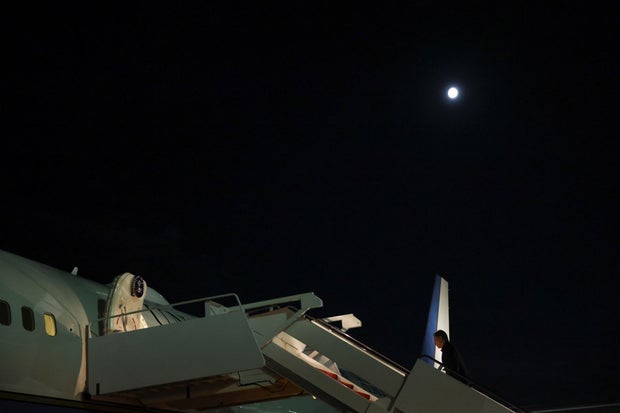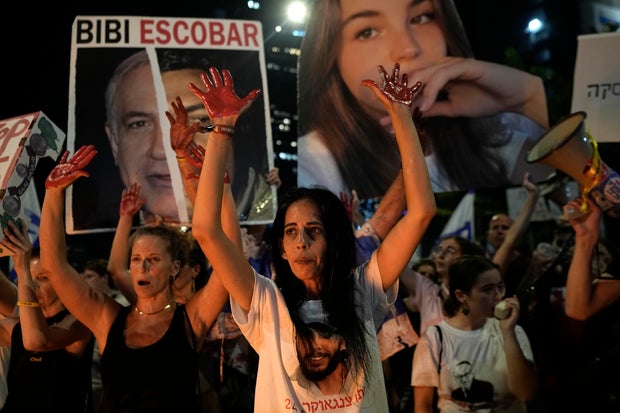Secretary of State Blinken in Middle East to help close Gaza cease-fire deal
U.S. Secretary of State Antony Blinken is in the Middle East to try to seal a cease-fire deal for Gaza after months of contentious negotiations between regional leaders.
Blinken, on his ninth diplomatic mission to the Middle East since the start of the Israel-Hamas war, arrived in Israel on Sunday to meet Prime Minister Benjamin Netanyahu, Defense Minister Yoav Gallant and President Issac Herzog on Monday. Blinken will travel to Egypt on Tuesday for meetings with officials there, the State Department said. He may stop in at least one other country in the region before returning home.
A senior official traveling with Blinken said his arrival in the region comes at a "critical time" in the ceasefire talks and the secretary would press all parties on the importance of concluding it quickly to end civilian suffering in Gaza and prevent the conflict from engulfing the region. The official spoke on condition of anonymity to preview Blinken's travels.
The U.S. and fellow mediators Egypt and Qatar have said they were closing in on a deal after two days of talks in Doha. President Biden on Friday seemed optimistic, saying "We are closer than we've ever been" to an agreement.
Mr. Biden has expressed optimism for a deal before, only for talks to break down.
"It's far from over. Just a couple more issues, I think we got a shot," he told reporters while traveling to spend the weekend at the Camp David presidential retreat.
Netanyahu's office expressed "cautious optimism" that a deal could be reached.
"It is to be hoped that the heavy pressure on Hamas from the United States and the mediators will lead to the removal of its opposition to the American proposal, and will allow a breakthrough in negotiations," a statement Saturday from Netanyahu's office said.
An Israeli delegation is set to travel to Cairo on Sunday for further talks.
However, Hamas has signaled resistance to what it says are new demands by Israel, and the long-running talks have repeatedly stalled.
On Sunday, Hamas released a statement accusing Netanyahu of "thwarting the efforts of the mediators" by setting new conditions for prisoner exchanges, a permanent cease-fire and Israel's military withdrawal from Gaza.
"After we listened to the mediators about what happened in the last round of talks in Doha, we were once again confirmed that Netanyahu is still placing obstacles to reaching an agreement," the statement read.
Hamas had earlier cast doubt on whether an agreement was near, saying the latest proposal diverged significantly from a previous iteration they had accepted in principle.
Hamas has rejected Israel's demands for a lasting military presence along the Gaza-Egypt border and a line bisecting Gaza where Israeli forces would search Palestinians returning to their homes. Israel says both are needed to prevent militants from rearming and returning to the north.
Israel showed flexibility in retreating from the border corridor, and a meeting between Egyptian and Israeli military officials was scheduled for next week to agree on a withdrawal mechanism, two Egyptian officials told The Associated Press, who spoke on condition of anonymity because they were not authorized to discuss the private negotiations.
Netanyahu has denied Israel has made new demands, but he has also repeatedly raised questions over whether the cease-fire would last, saying Israel remains committed to "total victory" against Hamas and the release of all the hostages.
The mediators have spent months trying to halt the fighting, efforts that gained new urgency after the targeted killing of two top militants last month, both attributed to Israel, brought vows of revenge from Iran and the Lebanese Hezbollah, raising fears of an all-out war across the Middle East.
A senior U.S. administration official said Sunday that what they've heard from Iran is that authorities there want to see a ceasefire.
"They don't want to see regional escalation," the official said, adding that they will keep monitoring Iran's actions.
The evolving proposal calls for a three-phase process in which Hamas would release all hostages abducted during its Oct. 7 attack, which triggered the deadliest war ever fought between Israelis and Palestinians. In exchange, Israel would withdraw its forces from Gaza and release Palestinian prisoners.
The mediators hope to end a war that has killed over 40,000 Palestinians, according to local health authorities, displaced the vast majority of the territory's 2.3 million residents and caused a humanitarian catastrophe. Experts have warned of famine and the outbreak of diseases like polio.
Hamas-led militants killed some 1,200 people, mostly civilians, in the Oct. 7 attack and abducted around 250. Of those, some 110 are still believed to be inside Gaza, with Israeli authorities saying around a third are deceased. More than 100 hostages were released in November during a weeklong cease-fire.
Overnight strikes in Gaza kill 19
The latest Israeli bombardment included a strike early Sunday on a home in the central town of Deir al-Balah that killed a woman and her six children, according to the Al-Aqsa Martyrs Hospital. An Associated Press reporter at the hospital counted the bodies.
Mohammed Awad Khatab, the children's grandfather, said his daughter, a school teacher, was with her husband and their six children when their house was struck. He said the children ranged in age from 18 months to 15 years, and that four of them were quadruplets. He said the father was hospitalized after the strike.
"The six children have become body parts. They were placed in a single bag," he told reporters outside the hospital. "What did they do? Did they kill any of the Jews?... Will this provide security to Israel?"
A strike in the northern town of Jabaliya hit two apartments in a residential building, killing two men, a woman and her daughter, according to the Hamas-run Health Ministry in Gaza. Another strike in central Gaza killed four people, according to the Awda Hospital. Late Saturday, a strike near the southern city of Khan Younis killed four people from the same family, including two women, according to Nasser Hospital.
Israel says it only targets militants and blames civilian deaths on Hamas because the militant group conceals fighters, weapons, tunnels and rockets in residential areas. But the monthslong Israeli bombardment has wiped out entire extended families and orphaned thousands of children.
In the Israeli-occupied West Bank, which has seen a surge of violence since the start of the war in Gaza, gunmen marched in a funeral procession for two Hamas commanders killed in an Israeli airstrike in Jenin the day before.






